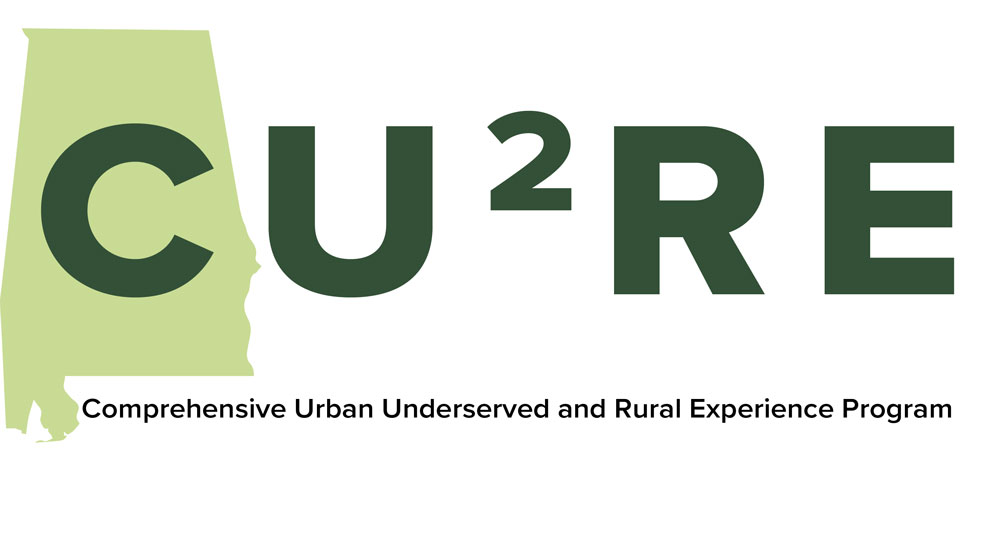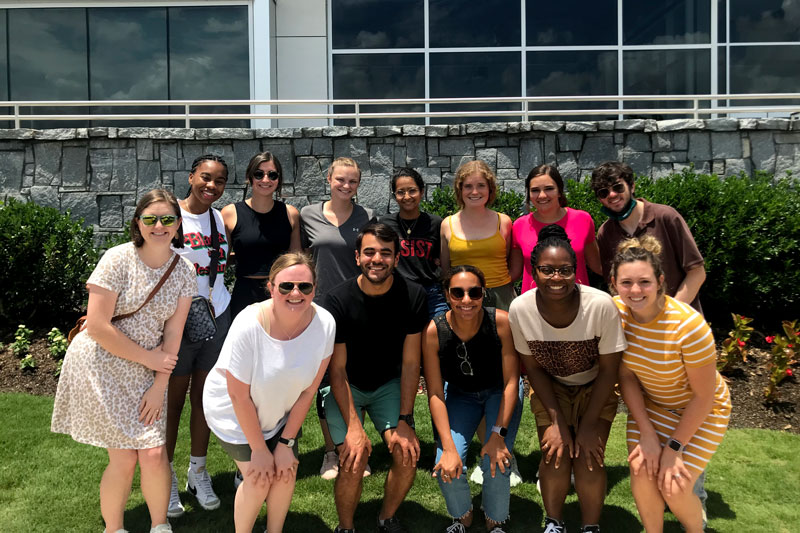
First-year medical students interested in health equity and serving others now have the chance to get early clinical experience-- and many other resources-- in a program specifically designed to support aspiring physicians who are eager to work in underserved areas.
The Department of Family and Community Medicine is currently accepting applications for its Comprehensive Urban Underserved and Rural Experience, or CU2RE program. CU2RE aims to enhance the recruitment, training, and retention of medical students interested in providing primary care in rural and urban underserved areas of Alabama and beyond.
“CU2RE has sharpened the edges of real clinical experience and brought the idea of practicing in an urban underserved area into greater focus. It has encouraged me to lean into the stories of patients I see in clinic and the underlying factors that have led them to [the clinic],” one CU2RE student stated.
The program has welcomed two cohorts of medical students-- eight in 2020 and 14 in 2021. First-year medical students from any of UAB’s four campuses are currently welcome to apply; the deadline is September 12. So far, feedback from students indicates the curriculum is doing its job. Based on an anonymous survey, participating students are deepening their interest in primary care, receiving excellent support from mentors and fellow students, and have felt very well-prepared for clinical patient care.
Program participants choose whether to practice in a rural or an underserved urban area, but they all focus on the same six core elements -- social determinants of health, telehealth, behavioral health, interprofessional education, cultural and linguistic competency, and practice transformation.
 Students in the second cohort of the program visited the National Memorial for Peace and Justice in Montgomery during their summer program.
Students in the second cohort of the program visited the National Memorial for Peace and Justice in Montgomery during their summer program.
“It has been an opportunity to strengthen clinical skills and learn how to incorporate social factors into encounters to see the bigger picture of the patient,” wrote one CU2RE student.
First year medical students receive early clinical experience, consistent mentorship from a primary care faculty member, and participate in service learning. They say an early introduction to clinical patient care has them primed for a career in primary care.
“I do not know another group or set of students that will have this experience moving forward. I wish I could do more for my patients, but I think even talking with them and talking about their needs has allowed me to grow immensely in my future practice,” a CU2RE student wrote.
CU2RE students also have extra resources and learning tools. During students’ first two years, they meet for monthly discussions regarding online modules and assignments. Additionally, with the help of research faculty, students complete a scholarly project that counts towards their scholarly activity requirement. They also have access to the Alabama Practice Based Research Network based out of the Department of Family and Community Medicine.
Organizers say one of the most valuable parts of the program is the patient panel, which offers students the opportunity to serve as health coaches for primary care patients. It allows participating students to “develop personal relationships with patients who represent varied points across the lifespan, to understand common medical conditions that might occur throughout a patient’s life, and to appreciate the concepts of disease prevention and population health.” With the ability to monitor these patients throughout their medical school career, students are able to act as their health advocate and play an integral role in their health care.
CU2RE coordinators look to go beyond graduating more quality primary care physicians. Part of the program’s purpose is to “develop students to enter primary care as leaders in their communities and profession.” One common thread in their summer programming and semi-annual retreats is personal and professional development. For example, they discuss leadership styles, values, biases, and the importance of emotional intelligence.
The program launched in 2020 after the Health Resources and Services Administration (HRSA) awarded UAB with a $7 million grant to address the primary care physician shortage in Alabama. A state map from the Health Resources and Services Administration reveals there are too few doctors in 62 of Alabama’s 67 counties. That is nearly 93%.
In the CU2RE proposal abstract for HRSA, UAB’s Heersink School of Medicine says this about the project:
“The scope and depth of these experiences will solidify the family medicine identity” as well as inspire student and preceptor “dedication to family practice in medically underserved communities in Alabama.”
According to Irfan Asif, M.D., chair of the Department of Family and Community Medicine and Associate Dean for Primary Care and Rural Health, Alabama needs “more than 600 additional primary care providers to meet the needs of the patients and the kinds of health conditions that we’ll be seeing by 2030.” That is why Asif insists the way to address the deficit is to “be aggressive in the family medicine and primary care programming that we develop and implement.” That is what CU2RE is all about.
First-year medical students interested in the program can learn more and begin their application here.